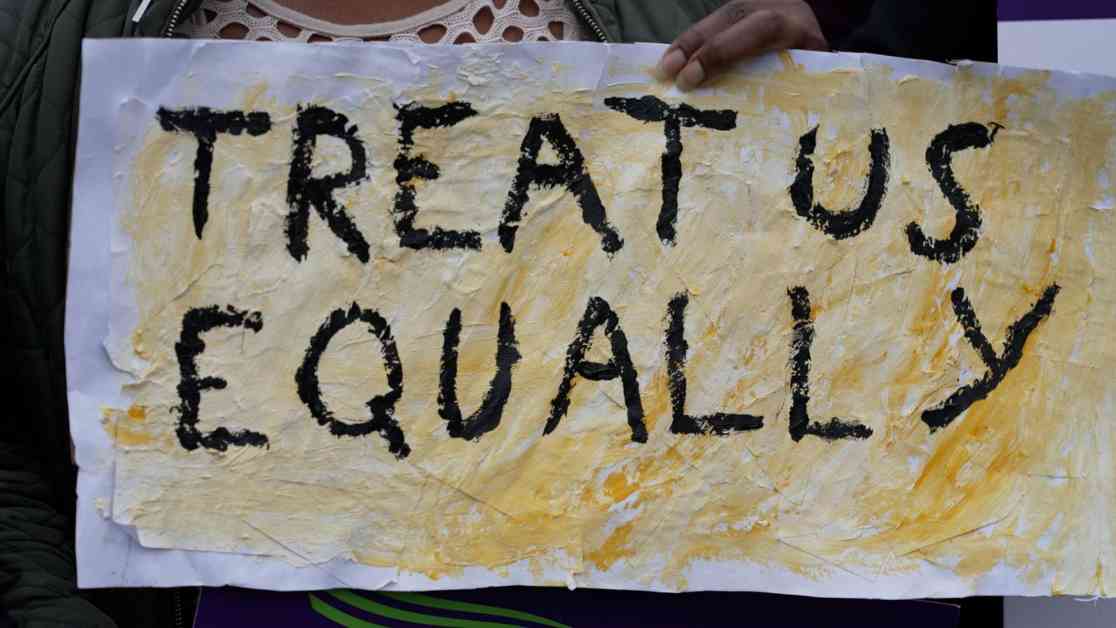NHS Black Women Staff Overlooked for COVID Bonus
Thousands of NHS staff who bravely worked on the frontlines of hospitals during the pandemic have been left feeling overlooked and undervalued. Despite the COVID bonus awarded to NHS staff last year, many lower-paid workers, particularly those who are female and from ethnic minorities, have been excluded from receiving this recognition for their sacrifices.
Sky News conducted a survey of outsourcing companies employing cleaners, porters, and caterers within the NHS and discovered that while some have paid their staff the £1,600 bonus, others have not. The disparity in bonus distribution often hinges on the type of contract the worker is under, determining whether the company was eligible to claim money from the Department of Health. Unions argue that this issue exemplifies the erosion of rights for staff within hospital settings.
One such individual affected by this disparity is Dima Hooper, a 57-year-old member of the catering staff at Homerton Hospital in east London, employed by outsourcing company ISS. Dima’s harrowing experience with COVID-19 in 2021, which left her on a ventilator in intensive care, underscores the risks faced by NHS workers during the height of the pandemic. Despite her near-death experience and ongoing battle with long COVID, Dima has not received the bonus, a fact she finds deeply unjust.
In reflecting on her colleagues’ dedication and sacrifices, Dima stated, “A lot of us risked our lives during that time, working six days a week, 12 hours a day through that period. Some people lost their lives. Some people can’t work anymore. I just think it’s not fair because we [were] all there at the same time, doing the work.”
The crucial role played by non-NHS staff, such as cleaners, caterers, and porters, in supporting the operations of hospitals during the pandemic cannot be understated. These unsung heroes, often on outsourced contracts, were instrumental in maintaining the cleanliness, hygiene, and morale within healthcare facilities. However, the exclusion of many of these staff members from the COVID bonus has sparked outrage and calls for greater recognition and equality in treatment.
Campaigners advocating for the rights of these overlooked workers have raised concerns about the disproportionate impact on black women within this group. Retired union worker George Binette highlighted this disparity, noting, “It is overwhelmingly women and overwhelmingly, frankly, black women who have not received this bonus, despite the fact that they were facing many of the same risks in terms of contracting the virus during the course of the pandemic.”
Occupational therapist Diana Swingler, who did receive the bonus, emphasized the importance of unity within the healthcare team, stating, “They are a crucial part of the team. We are all one team, and that’s why it’s all the more shocking that they’re being treated differently and unequally.”
The complex web of contractual arrangements and funding mechanisms has contributed to the confusion surrounding the distribution of the COVID bonus. Companies like ISS, Serco, and Aramark UK have grappled with varying circumstances that have influenced their ability to provide the bonus to their NHS employees. While some have managed to secure funding and compensate their staff, others have faced challenges in accessing the necessary resources for such payments.
The GMB Union has been at the forefront of advocating for fair treatment and recognition of all healthcare workers, regardless of their contractual status. Rachel Harrison from the GMB Union emphasized the need for a comprehensive review of the privatisation of NHS services, urging the government to prioritize bringing all workers back in-house and onto NHS contracts to ensure equitable treatment.
Despite the Department of Health and Social Care’s provision of funding for over 27,000 staff in non-NHS organisations to receive the bonus, significant gaps remain in the coverage and eligibility criteria. The department’s spokesperson highlighted the autonomy of independent organisations in determining their employees’ terms and conditions, underscoring the need for greater transparency and accountability in the allocation of resources.
As the debate around the COVID bonus continues to unfold, the voices of frontline workers like Sandra McCarthy, a caterer at Homerton Hospital who did not receive the bonus, serve as a poignant reminder of the sacrifices made by those often overlooked in the healthcare system. Sandra’s sentiment that “It’s like people clapped for the others and left us out” echoes the frustration and disappointment felt by many who played a vital role in the pandemic response.
In conclusion, the issue of NHS black women staff being overlooked for the COVID bonus underscores broader systemic inequities within the healthcare system. The need for transparency, fairness, and solidarity among all healthcare workers is paramount to ensuring a just and inclusive environment for those who selflessly serve on the frontlines of healthcare. The ongoing efforts to address these disparities and advocate for the rights of all NHS staff are essential in building a more resilient and equitable healthcare system for the future.













